Rye Barcott's Blog, page 11
November 27, 2016
Home Visits with Esther
By: Micaela Arneson, CFK Peacock Fellow
—
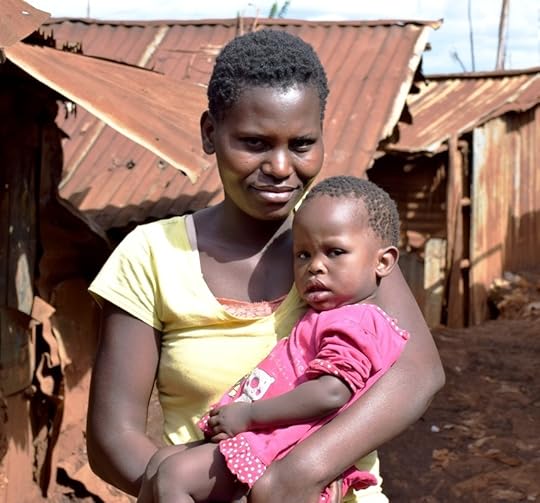
Millicent and Mary, photographed during their home visit.
Recently I had the opportunity to tag along on a couple of “home visits” with Esther, one of the nutritionists at Carolina for Kibera’s Lishe Bora Mtaani Nutrition Center. Our destination was Gatwekera, a village in Kibera located south of the CFK office.
CFK staff members and Community Health Workers (CHWs) conduct regular home visits for several health-related reasons. CHWs go door-to-door to administer health surveys, acquiring basic health information from families all over Kibera. They also screen children for malnutrition; if the child is malnourished, they send them to CFK’s Nutrition Center. The purpose of our visits was a little different. We were checking up on some of the children who had completed the Nutrition Center’s 8-week program and been successfully brought back to full health earlier this year.
Esther is a resident of Gatwekera and led me through the maze of houses and narrow, winding streets— it’s been raining recently in Kibera, and although the dirt alleyways have been turned to thick, slippery corridors of mud, Esther made her way quickly and nimbly in her flats while I struggled to keep my balance in a pair of oversized gum boots.
Our first stop was at the home of Millicent and her 2-year-old daughter Mary, who was released from the nutrition center in January. As we stepped inside their home, Mary instantly hid herself behind the curtain separating the family’s bed from the main living area— she was happy to see Esther (her second mom/auntie), but wasn’t too sure about me. We sat down with Millicent and Esther asked her about Mary’s progress and status since leaving the center. She’s maintained a healthy weight, has good energy, and is meeting important developmental milestones such as walking and talking. Her mom told us that Mary is also a great eater: her favorite foods are rice and beans, spaghetti, and cabbage. Millicent also recently referred a neighbor to the nutrition center.
The home visits with Mary and other former patients of the nutrition center are a critical element of its holistic approach to treating malnutrition. Parents are equipped with the knowledge and skills to keep their children strong and healthy, and follow-ups serve to identify any challenges and provide support and assistance where needed. It was exciting and encouraging to meet the plump, happy, and healthy babies and their equally happy parents—it takes a village to raise a child, and nowhere does that ring truer than here in Kibera.
November 21, 2016
#CleanHandsSaveLives
Sometimes it’s the simple fixes – like washing your hands – that help keep you and your neighbors healthy. This is true in the United States, and it is just as true in Kibera. As CFK Community Health Project Officer, Yunus Mohammed, explains, “Our own hands are another leading disease transmitter. When they’re not kept clean, they can turn into dangerous weapons against our own lives, especially the lives of our young ones.”
This message resonated with Ben and Amir, 2 of our 2016 summer volunteers. Ben and Amir are both medical students at the University of Leeds in the UK. Their main goal during their 8 weeks in Kibera was to volunteer at the Tabitha Medical Clinic and Lishe Bora Mtaani Nutrition Center, while also studying causes and solutions to chronic diarrheal disease in young children.
As a result, they became fascinated with our community health initiative. Run in partnership with Ronald McDonald House Charities, the project provides hand-washing stations in Kiberan homes and education about the importance of sanitation and hygiene. Ben and Amir came up with a wild idea: to carry a tap to the top of Mount Kenya, Kenya’s tallest peak! Since a typical hand-washing station is comprised of a tap or faucet and a “jerry” can, they nicknamed the tap, “Tom,” in honor of the popular cartoon. Watch a video chronicling their trip below:
Once their plan was set, they reached out to friends, family members, and strangers to raise money for more hand-washing stations in Kibera. At the end of their campaign, they raised thousands of dollars to sponsor their climb, which will provide hand-washing resources for hundreds of Kiberans. Thank you, Ben and Amir, for going (literally) above and beyond in the name of health for Kiberans!
November 13, 2016
Meet Andrew Kiptum, Our New Monitoring & Evaluation Officer
Andrew Kiptum doesn’t split hairs when it comes to measuring Carolina for Kibera’s impact. When you’re talking to community members, he explains, “The numbers don’t mean anything by themselves sometimes. You have to show the community how what you’re doing will help by connecting the numbers to an overall result or change.”
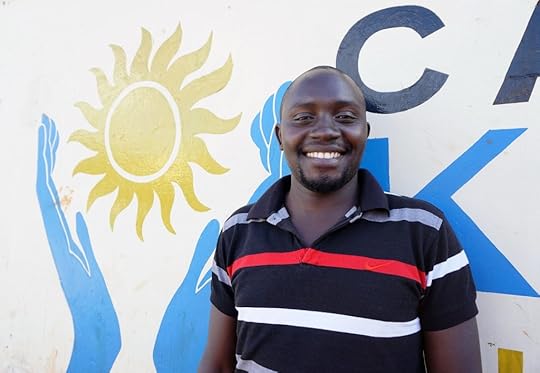
One of CFK’s main objectives for this year is to take our monitoring & evaluation (M&E for short) systems to the next level—and Andrew, with his wealth of experience in data analysis and M&E is the right person to captain the ship. With the groundwork we have built through our fruitful collaboration with Ronald McDonald House Charities (RMHC), we are well positioned to improve existing M&E services and extend them to other programs as well.
Andrew earned his degree in Applied Statistics from Maseno University in Kisumu, Kenya’s largest city on Lake Victoria. Upon graduation, Andrew worked at TNS Research International for 6 years. Though he started as a data clerk, he showed his affinity for interpreting trends from data and was promoted to a data analyst.
Working at TNS was a great first step, but Andrew eventually sought more passion from his work. Thus began his career at the Collaborative Center for Gender Development (CCGD), a research and advocacy organization seeking to understand gender-based violence in areas like Kibera. This can include everything from sexual assault and domestic violence to female genital mutilation and early marriage. “One thing I noticed a lot,” he admits, “was that there are some in our society who believe that women should be beaten once for the marriage to be good or ‘proper.’ We were fighting against that stigma.”
While at CCGD, Andrew worked with organizations and partners who, like Carolina for Kibera, offer education and services for sexual, reproductive health and rights. He heard about CFK from a friend who read co-founder Rye Barcott’s book, It Happened on the Way to War. It sounded familiar, and for good reason: Andrew used to stay in the nearby neighborhood of Fort Jesus, where Rye also stayed on one of his return trips to Nairobi. Luckily for Andrew, CFK was hiring, and his values and skill set made him a perfect fit for the Monitoring & Evaluation Officer position.
Andrew wasn’t just hired for his skills though—he was also hired for his vision. One of the main components of that vision is to create a more robust, digital data collection system. Collecting data on handheld devices is more nimble and reliable, and allows for more quality control and GPS tracking. All of these features will be helpful in an informal settlement. “Adapting best practices for data collection will be the main hurdle for this system,” Andrew explains. In Kibera, many unforeseen problems can take you by surprise.
Andrew is planning for them, however. Through careful planning and thoughtful approaches to data collection and analysis, he will help our team demonstrate CFK’s effectiveness more clearly. “With clear organization and reporting, the data reinforces our impact,” he says, confidently. With systems like these, Andrew is ensuring CFK can demonstrate its success for a long time to come.
November 10, 2016
A Strong Voice for Kiberans
Jeff Mogire got his start in radio by happenstance. Through his participation in CFK’s Sexual and Reproductive Health (SRH) program, Jeff was offered a slot during the program’s show at nearby radio station, Pamoja FM. It was his first time speaking, but everyone at Pamoja FM was wowed by his voice, which sounded strong and tailor-made for radio.

Jeff, second from left, poses in Pamoja FM’s booth with (from L to R): Uncle Jarse, Headboy, and Felix.
Jeff began cultivating his strong voice (both literally and figuratively) when he was young. Growing up, he would watch A-list newscasters on CNN, BBC, and local TV stations. (His personal role model is Richard Quest.) In high school, he decided to put himself out there, and began presenting news reports in front of his peers at school assemblies. His classmates loved his style, which encouraged Jeff to pursue a formal career in journalism. (You can find some of the news reports he did with local station QTV here: Maji Taka and Maandishi ya Nguo.)
After high school, he carried his new confidence with him and began volunteering as a Youth Peer Provider (YPP) through CFK’s Sexual and Reproductive Health program. YPPs serve an important role in educating Kiberans about their health—and helping them access services that CFK provides. As Jeff explains, “We mobilize people and tell them about many things: getting tested for HIV, family planning, condom use, ending gender-based violence and female genital mutilation.”
He also stressed the importance of being educated by peers rather than outsiders. “For example,” he says, “a bunch of people believe that contraceptives are sent by white people to kill Africans. When you find someone like that, you approach them as friends first. Only after that do they trust you as an educator.”
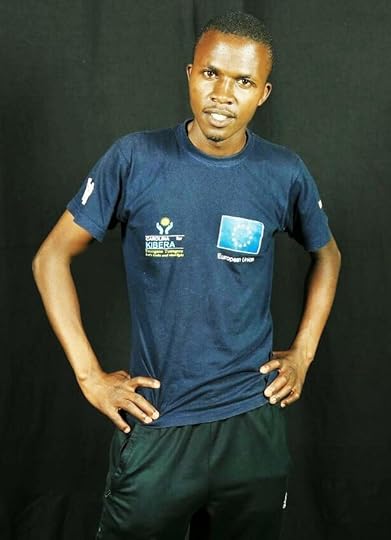 Now, Jeff is a trusted figure in the community, able to effectively connect people with vital services to improve their health. Like any radio personality, however, he can be polarizing. His blunt honesty is particularly striking. “Most people don’t like me when I tell them the truth,” he admits, laughing. “People have different perspectives about what I do and what I say. But I’m trying as much as possible to live by the values I tell people.” Those values? “Not stealing, not being corrupt,” to name a few.
Now, Jeff is a trusted figure in the community, able to effectively connect people with vital services to improve their health. Like any radio personality, however, he can be polarizing. His blunt honesty is particularly striking. “Most people don’t like me when I tell them the truth,” he admits, laughing. “People have different perspectives about what I do and what I say. But I’m trying as much as possible to live by the values I tell people.” Those values? “Not stealing, not being corrupt,” to name a few.
Beliefs that are also central to Jeff: hard work, integrity, and personal freedom. Jeff does not have access to steady income, doing casual labor for funds here and there. He stays in Kibera with an uncle, which helps him save up for his diploma program (a 2-year degree) in Journalism and Mass Communications from the Intra-Global Training Institute. It’s a hard situation, but he’s putting his nose to the grindstone nonetheless. “It’s going to be a long walk for me to be a journalist,” he says with conviction. “I don’t need to be known, I just want to do the job.”
Jeff is thankful for the opportunities he has accessed through CFK, even those that come about by luck, like his recurring radio segment on Pamoja FM. He’ll do whatever it takes to tell the untold stories of happiness, hard work, and dedication from Kibera. “I believe in a society where it doesn’t matter where you come from, what your last name is, what you look like, but one where you can make it if you try.”
October 3, 2016
How Bernice Links Design & Social Change
Bernice knows that to make change, you must approach a problem from all angles. The problem she has always been compelled to solve is how to advocate for the rights of adolescent girls. When we interviewed Bernice—Bancy for short—in our 2015 Annual Report, her passion for educating her peers about the importance of reproductive health came through loudly and clearly. “It pains me to see young girls having babies when they could’ve had the chance to go to school and create a different future.”
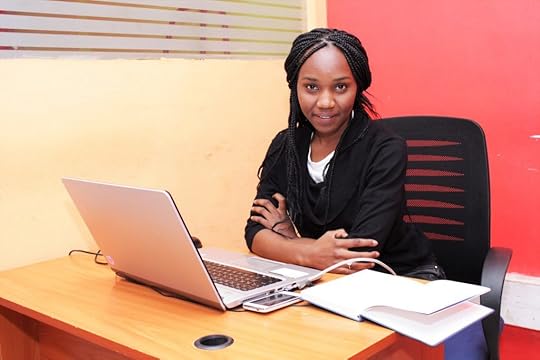
So, if advocating for girls’ rights is her ultimate goal, why would she spend hours learning how to create web pages? First, spreading information online is the fastest—and often most effective—way to communicate it. Beyond that, Bancy hints at something else, saying, “Empowering girls to learn web design skills is important because it helps girls see technology as a new tool for self-expression.” And when girls have the confidence to express themselves? “They can help their family and the rest of society too.”
Through CFK’s unique partnership with Nairobits, a Nairobi-based organization that empowers young people through computer and web-based skills, we have created an environment where girls can take classes to become proficient in web design, programming, and graphic design. At the CFK-Nairobits Girls Center, girls can learn alongside other girls, empowering each other to take the next steps towards confidently marketing themselves in an online space. (You can see some examples of their work here.)
For Bancy, that sense of community is indispensable. “I like learning alongside other girls since any time girls come together with collective intentions, they do amazing things.” One of those amazing things is to use the tools she has learned to inform other girls about reproductive health. She adds, “Can you imagine living in a world led by educated women?”
Bancy sure can. One of the best aspects of the classes, she says, is that they’ve encouraged her to think critically and solve problems. “My favorite aspect of the course is language programming since it helps me think better by mapping my mind,” she explains. “Learning new programming languages creates a different way of solving problems.”
Acquiring these skills is opening doors for Bancy. Earlier this year, she was offered an internship at Oracom, one of Kenya’s premier web design companies. Through her internship, she helped design a new site for MAC Dental, a dental office in the town of Thika, Kenya (about an hour outside of Nairobi). Building that site was a rewarding experience and cemented her commitment to using web design to communicate reproductive health advice to girls. She reiterates, “I’ve learned from participating at CFK that taking advantage of diverse opportunities will help you have a chance to achieve what you want most.” Between opportunities to learn web design, advocate for reproductive health, and internships, it’s clear that Bancy is taking her own advice.
September 7, 2016
Staff Reflection: Putting Community at the Forefront of Scholarship
By: Jeffrey Okoro, Education Program Officer
—
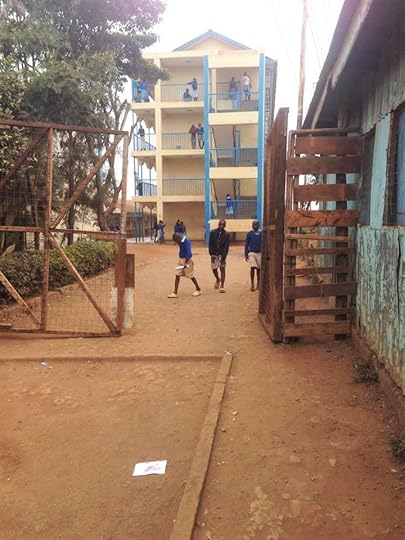 This is the entrance to Olympic Primary School.
This is the entrance to Olympic Primary School.
It is arguably the most noteworthy school in Kibera, not only for its towering structure but also for the numerous academic accolades it has won over the years. Many prominent alumni—including the current area Member of Parliament Kenneth Okoth, architect Erick Miseda, and high profile event organizer Fakii Liwali—trace their roots back to Olympic Primary.
Located in Olympic Estate, right down the road from Carolina for Kibera’s main office, the school forms part of what the locals call “Community Gate,” one of the largest entrances to Kibera. The school’s student body is a cultural mosaic of children who come from a vibrant and diverse range of different ethnic, economic, and political backgrounds from both Kibera and other parts of Nairobi. At Olympic, kids can be kids and forget about the challenges of life outside the school gates for 8 hours a day.
Given its proximity to Kibera and its commitment to ethnic cooperation, also one of CFK’s core values, it was a great privilege and opportunity for Carolina for Kibera to be invited to Olympic Primary’s 2016 parents and stakeholders meeting, and for CFK’s Executive Director, Julian Rowa, to serve as the keynote speaker. Julian has been with CFK for the past eight months, and candidly admits that Kibera is a unique community that he still has much to learn about. With his fresh perspective as an outsider, Julian’s keynote speech and interactions with parents and stakeholders garnered a lot of positive interest.
Between Julian’s speech and concerns shared by the parents and community stakeholders at the meeting, attendees emerged with several takeaways:
It takes a village to “raise” an effective student. CFK has always been a community-led organization that does great work. But this is only representing part of the sense of community that we have built over 15 years. We are often portrayed as “serving the community,” with us talking about “what we do” in Kibera. However, to be truly community-led is to shift the discussion to the power that community members have. Community members can ensure that our students strive for opportunities to succeed in life, as well as how we can all create a more cohesive community in light of recent events that have sparked protests in Kibera.
People will tell you what they need, not the other way around. In any setting, professional or casual, it can be easy to assume we know what people’s problems are and impose solutions without actively listening to their situations. Numbers serve an important role in lifting up groups of people, but those numbers are informed by personal experiences—and in order to absorb personal experiences, listening is crucial. I have learned that sharing heartfelt stories can have a profound effect on how others relate with you. People, even absolute strangers, instantly connect through stories.
Speak from both the heart and the mind. Though he has a mind for analysis and risk, much of Julian’s speech focused on his own personal story and how it connects to community building in Kibera. Julian shared a bit about his childhood growing up in the chaotic neighborhood of Jericho—a wild and violent neighborhood in Nairobi with an infamous reputation for drugs, crime, and gangs. With little hope for the future, Julian persevered; he credits his many mentors for helping him find traction in life as a young adult. His story mirrors challenges similar to what many students in Kibera face every day, and the mentorship he received is something we strive to provide—and want to take to the next level—at CFK.
Strive for unity and diversity both inside and outside our own communities. By embracing others’ differences, we can create powerful synergies between ourselves and uplift the spirit of humanity. In an increasingly connected world, we only harm ourselves by viewing life through a tribal lens and isolating ourselves from others. Julian stressed this notion in his speech, saying, “Love, respect and reach out to your neighbors since there’s no telling who you could run to for help. Indeed, you are healthy now but you may find yourself knocking on your neighbor’s door for water.”
Above all, we wish to unite all Kiberans in the effort to uplift our community. To succeed, CFK must engage with the community in transparent and honest dialogues. It can only truly do its best work when the organization and the community are joined together in a common vision as equal partners. In the field of community development, having candid dialogues with local citizens and stakeholders is vital to creating trust and understanding. As the Education Program Officer, my aim is to do that through providing scholarships for and fostering friendships between students. While community engagement and participation has always been a central pillar of our work, pushing it further to include real conversations that are honest, open, and facilitate further consultation is critical to the success of CFK and the community of Kibera.
August 18, 2016
The Power of a Camera: Lizz’s Photo Essay
A few months ago, we published Cheryl’s photo essay, “Water in Kibera,” as part of our collaboration with ARTKIDS Foundation to teach photography skills to girls in our Binti Pamoja Girls Program. That essay explored in depth the blessings and dangers of water in Kibera, and how water can be a life-giving or destructive force.
This week, we’re bringing another story to you: “Soweto Neighborhood,” by Lizz. Soweto West is one of Kibera’s 12 villages, situated very close to CFK’s main office on the western edge of Kibera. Through her photos, Lizz paints a portrait of her crowded neighborhood and the different sights she sees every day. Some of them might inspire and surprise you!
Soweto Neighborhood
By: Lizz
Binti Pamoja Photography Training Project
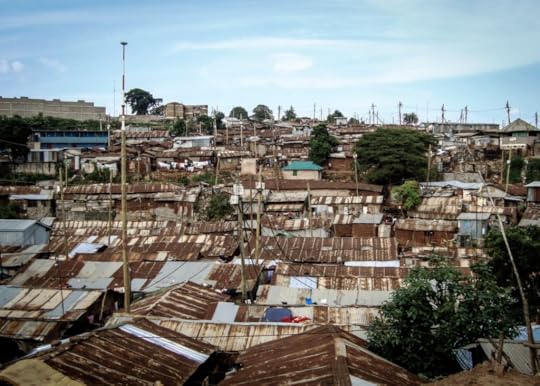
Soweto is a village located in the Kibera slum of Nairobi.
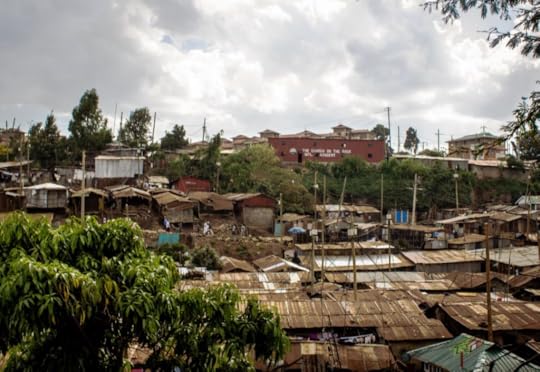
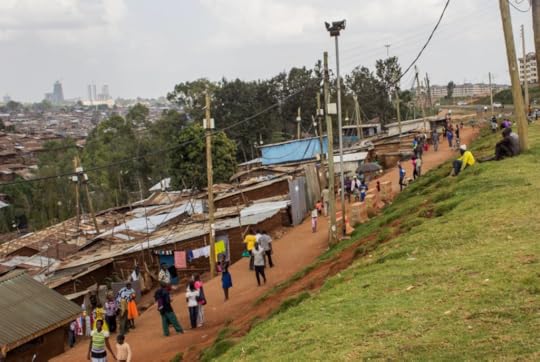
Many residents in Soweto have their own business to make a living. Some people open small shops just next to the door of their houses. They sell tomatoes, onions, sukuma wiki (leafy greens), and eggs.


The railway to Uganda passes through the center of Soweto.
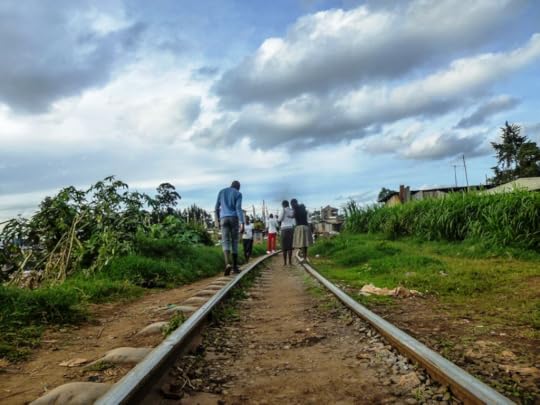
Water in Kibera is not free. Therefore, people from Soweto and other villages in Kibera store the water that comes from the rain. They store it in basins and buckets and use it later to wash their clothes.
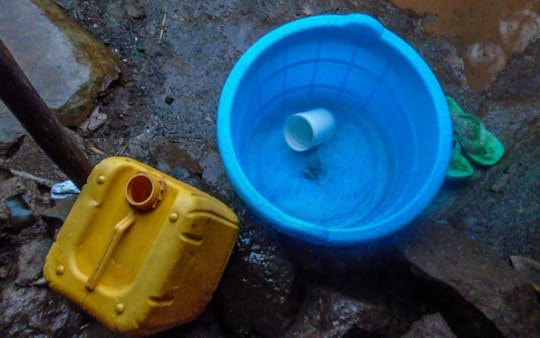
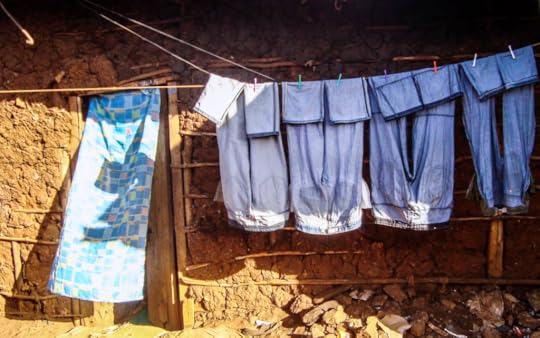
Some roads are very bad and the condition of the roads becomes even worse during rainy seasons.
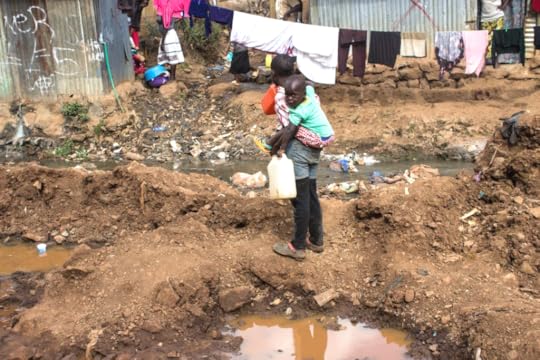

This is a young boy taking breakfast. Mandazi (doughnuts) and tea is the usual breakfast for children in Kibera.
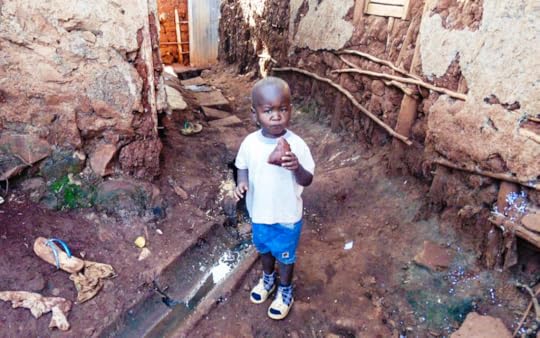
Some children face risks when they are playing, like these two children playing next to an electrical wire. Children who are very playful are not aware of the danger and can be electrocuted.
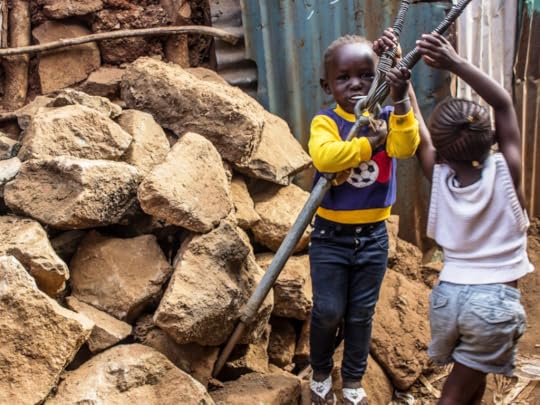
This is a girl removing ashes from the jiko (stove). She is very busy. After removing the ashes she will take the jiko inside of the house and cook for her family.

It’s Sunday. People from a church in Soweto are singing, dancing and celebrating. Anyone is welcome to join them.
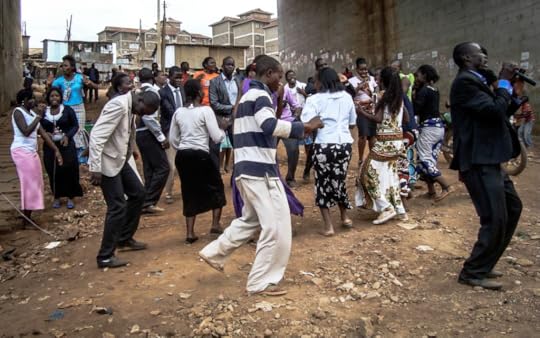
They are building a new road through Soweto. Many houses were demolished for this road to be built.
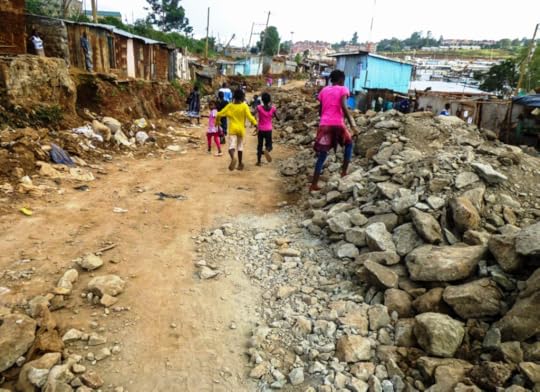
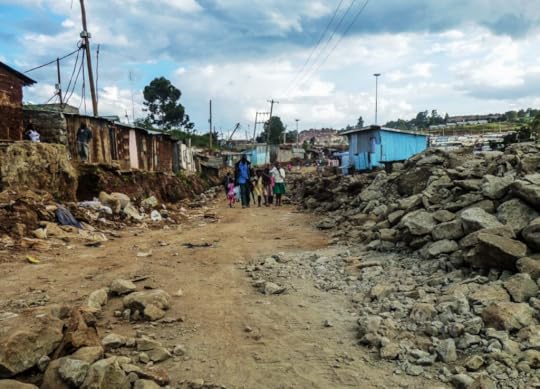
Two girls are looking out over Soweto. How big and how crowded it is!

August 10, 2016
An Interview with Hillary Omala, Former CFK Executive Director and Current Board Member
Hillary Omala favors pursuits that keep him on his toes. Even when things are going well, the former CFK executive director—now a member of the board in Kenya—appreciates new challenges to work through and new perspectives to learn from. “Sometimes I look at each role I’ve had as a different time period,” he explains. “If you’re able to perform your job competently, you may have little motivation to improve or update your skills regularly. There’s a tendency to settle into predictable routines. Skill-sets keep evolving, and you need to find space to either practice or expand those skills.”
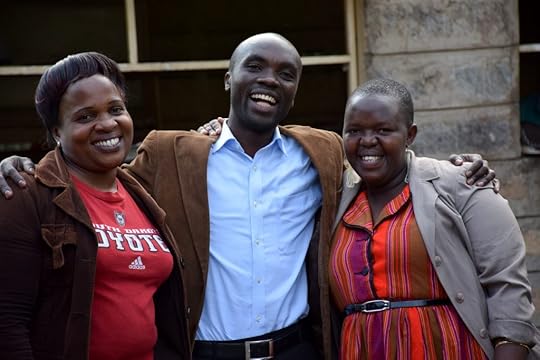
Hillary Omala, current CFK board member, with Esther, CFK Nutritionist, and Jackline, CFK Nutrition Center Data Analyst.
In late 2014, Hillary did just that, wrapping up his 3-year tenure as Carolina for Kibera’s Kenya-based executive director. Before that, he worked with the U.S. Centers for Disease Control and Prevention (CDC) as the manager of the Tabitha Medical Clinic for 4 years. “The time was ripe for a new challenge. Broad-based knowledge across diverse sectors positioned me well for a new experience in the education sector.” He adds, later, “CFK put me at the forefront of diverse initiatives that delivered incredible solutions to challenges facing communities in urban slums. The Kibera community has seen and seized the opportunity to develop new knowledge that promises new horizons.” CFK is lucky to have him and his talents as part of our leadership and advisory teams. After all, he did tremendous work shaping CFK into the organization it is today, especially in regards to our health education and disease prevention initiatives carried out by Community Health Volunteers (CHVs) and the diversification of services—including cervical cancer treatment and prevention—at the clinic.
Now, Hillary is hard at work with two new ventures. He is the executive director at Kakenya Center for Excellence, a Kenya-based nonprofit that seeks to empower and motivate young girls through education to change their communities and harmful cultural practices they face, such as female genital mutilation and early marriage. “For someone who has a lovely daughter,” he confesses, “I’m more attracted to programs that improve girls’ lives.” Right now, he’s excited to be a part of an organization that is actively creating more opportunities for girls, his daughter included, to advocate for their rights. “At Kakenya, we’re building a platform that empowers girls to participate in development in all levels.” This includes every field, from for-profit businesses and non-profits to artistic and political endeavors. “In Kenya, as in many parts of the world, women are underrepresented in most positions of power due to many barriers such as access to education and health,” Hillary adds.
As if leading an organization like Kakenya wasn’t enough already, Hillary has begun his own health consulting company. Through Enai Group, he is advising health practitioners, companies, and nonprofits on how health education and treatment intersects with environmental sustainability. “There are many aspects of the healthcare industry that are often changing,” he explains, “including health-seeking behaviors, ability and willingness to pay among clients, and emerging infections, among others. Enai Group creates a platform that helps healthcare agencies deliver better value for clients, while also activating the link between environmental sustainability and health.”
Hillary carries lessons learned through CFK with him in his role as a board member, although sometimes the distance that must be maintained is hard to manage. “Figuring out my relationships with staff members has been hardest so far.” When asked to elaborate, he says, “I was their colleague, but now I’m in an oversight role, which means less direct involvement. For many of these programs, I was involved in their design, expansion, and progress. I am very excited to see where they take the work, and at the same time, it’s hard not to be somewhat protective.”
His discerning approach will help CFK choose the path forward wisely so we can have the greatest impact. “Having one executive director is a huge opportunity to figure out a new strategy for the next 5 years.” And the thing Hillary anticipates most? “Taking our experience working in a complex environment like Kibera and helping others who work in similar contexts around the world. That keeps me really excited.” We’re excited too for a different reason—that Hillary, with his expertise in health systems and institutional memory of CFK, has joined as a director on our board for the years to come.
May 31, 2016
Watch Susan Mueni’s TV Interview on Her Upcoming Trip to London!
Last December, we announced that Susan Mueni received an incredible opportunity to participate in the Queen’s Young Leaders Programme, a comprehensive leadership development program that will culminate in a 1-week visit to the UK this summer. And this visit isn’t like other visits — while she’s there, Mueni and those in her cohort will meet Her Majesty the Queen! For Mueni, that part still hasn’t really sunk in yet: “I’m really nervous and I still can’t believe it. Out of all the things that I’ve ever imagined, I never imagined shaking hands with the Queen.”
Mueni was recently featured in a primetime interview on Kenya’s K24 channel, where she discussed her upcoming trip! In the interview (which you can watch above), she discusses at length how soccer has instilled values in her, and how she plans to bring skills learned during the program back to Kibera. “I hope when I come back,” she explains, “I will have learned a lot and be ready to make more change in the community.”
Congratulations again, Mueni, both on the Queen’s Young Leaders Programme and your tremendous interview!
May 12, 2016
Hop, Step, and Jump: How a Kids’ Game Is Reflected in Scholarships
By: Joshua Omweno, CFK Intern
–
Hiking through a maze of tin and mud-thatched structures in Kibera—and that’s what it is: hiking—makes walking for a mile seem much longer. I hastily race behind Peter Shikanga, carefully balancing on the steep rocks close to the river as we make our way to Lindi village on the southern edge of Kibera. The river is flooded today, not because it rained but because broken sewage pipes upstream are spilling their contents into the river, further polluting the river and exposing the residents to water-borne diseases. As we cross, we hop, step and jump on the rocks like little kids to avoid the graying water.
Peter, my travel companion, is a night guard at a shop in Hurlingham, a small commercial center within the Nairobi suburb of Kilimani. He earns around $60 a month and is the breadwinner for his family. He has 3 children, but he is also a guardian to Sheila Minayo, an orphaned girl he has taken care of since she was in her diapers. On our way to his home, he narrates with nostalgia how quickly she has grown. He has raised her ever since her single mother passed on when she was a baby. He regards her as one of his own.
[image error]And Sheila is the reason why I’m traveling all this way. She has applied for a scholarship from CFK, and I’m going to interview her to see if she is a good fit. Carolina for Kibera’s Education Program offers scholarships to promising students from Kibera in need of financial assistance for secondary school. We believe that education is the cornerstone for a successful future, and that it should be accessible by students with a demonstrated passion for learning.
After making the umpteenth turn, we finally arrive at “the base,” a shaded area in Lindi village, thanks to a courtyard of large baobab trees where young men spend most of their time talking politics, football or relaxing. “The base” is only a few meters from Peter’s home. We finally arrive at a leaning one-room structure where Peter resides; the sunlight reveals the gaping holes in the structure despite their best effort to cover the room with newspapers.
I meet Sheila, who appears eager to interview for a scholarship, full of nervous excitement. Sheila has already been interviewed once in our office to determine her drive and level of need. After brief introductions, the second part of the process begins: the home visit, to determine a family’s level of need and commitment to their child’s education.
After a successful interviewing process, I leave the humble home of Peter, with both him and Sheila having high hopes. Sheila was the best student in her school during their Kenya Certificate of Primary Exams (like the SAT in the US). Though she did not meet our average score, what makes Sheila stand out from the pack of applicants for our scholarship is her determination, proven leadership skills, and desire to learn. And those qualities make her one of our top contenders.
Fast forward to present day: in a packed room of 22 eager parents and 5 CFK officials, the room breaks into applause as Julian Rowa, CFK Executive Director, informs the parents that their children have been awarded CFK high school scholarships for a maximum period of 4 years. He further reminds the parents of the importance of community service and that they should take charge of the change they want to see in the community.
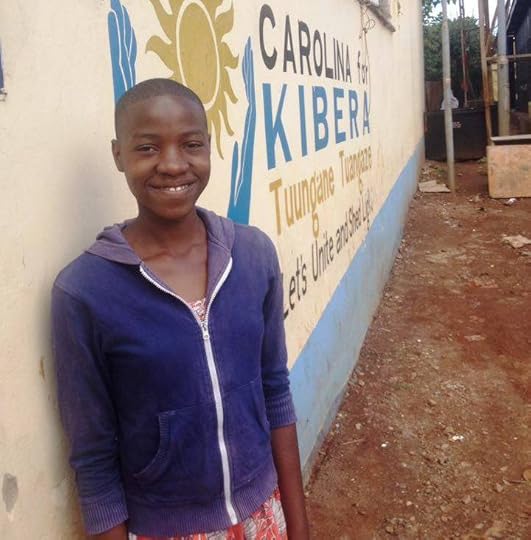
Speaker after speaker narrates the importance of investing in the young people especially by providing scholarships and leadership development. I look back at Sheila’s story and get a warm feeling knowing that CFK has invested in a young girl who was likely to drop out of school if she couldn’t find financial assistance. There are no safety nets or government programs to support students who go to secondary schools, and informal schools (schools found in the informal settlements that are inadequately equipped, mostly led by individuals of faith based organizations) do not have the money to extend private scholarships to students.
I take the challenge of developing young leaders such as Sheila with pride as I was also a CFK scholarship recipient. Through students like these, I am reminded that life is at times like “Hop, Step, Jump,” a little game I used to play in Kibera as a kid. Proving the scholarship makes the Hop, developing character and leadership is a big step towards a bright future, and becoming a positive influence to the community is the final jump. When you land after that jump, you have closed the loop and helped so many others begin to change their lives for the better.
Rye Barcott's Blog
- Rye Barcott's profile
- 7 followers



